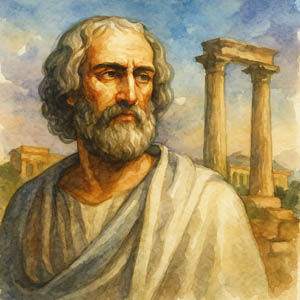~ Euripides
 Greek playwright Euripides (480–406 BC) was born on the island of Salamis and grew up in Athens.
Greek playwright Euripides (480–406 BC) was born on the island of Salamis and grew up in Athens.
Euripides used the stage to explore the inner lives of women, outsiders, and gods. With language both poetic and piercing, he illuminated the human cost of war and helped shape modern psychological storytelling. His tragedies, born of myth, still echo with emotional truth.
Along with Aeschylus and Sophocles, Euripides wrote history's great classical tragedies. A student of philosophy and poetry, he wrote his first tragedy at age 18.
“Let my heart be wise. It is the god's best gift,” he wrote.
Popular and controversial, Euripides wrote with elegant creativity. Of his estimated 90 plays, 18 have survived time and include: Medea (431), Hippolytus (428), Electra (417?), and Helen (412).
He observed, “Do not consider painful what is good for you.”
Euripides was an innovative writer who focused on the ordinariness of his characters. His tragedies examined the notion that each mythological hero had a tragic flaw that led to downfall. He used the device deus ex machina, where a god resolves hopeless situations.
“Only our characters are steadfast,” he said, “not our gold.”
With simple language and intricate plot, Euripides examined the social, political, and religious views of his time. Greatly influenced by the philosopher Socrates, he lived his life in search of wisdom and shared his knowledge through his writings.
 Embrace the simple goodness of life.
Embrace the simple goodness of life.
